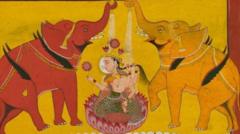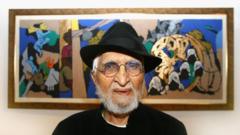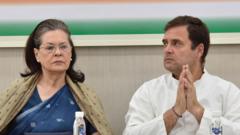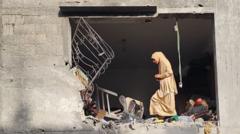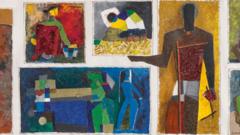The Delhi court's decision to seize two artworks from the late artist MF Husain is firmly rooted in ongoing controversies surrounding depictions of Hindu deities in his work, raising significant discussions about artistic expression and religious sentiments in contemporary India.
Delhi Court Orders Seizure of Controversial MF Husain Paintings
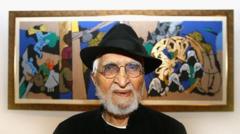
Delhi Court Orders Seizure of Controversial MF Husain Paintings
A court in Delhi has approved the seizure of two paintings by renowned artist MF Husain following a complaint regarding religious sentiments.
A court in Delhi has given the police the green light to confiscate two artworks by the late MF Husain, prompted by a complaint that claims the paintings offend religious sentiments. Displayed at the Delhi Art Gallery (DAG), these artworks feature Hindu deities Ganesha and Hanuman alongside nude figures. The court's ruling was based on a complaint filed by Amita Sachdeva, a lawyer who documented the images during her visit to the gallery.
The exhibition, titled Husain: The Timeless Modernist, showcases over 100 works of Husain from October 26 to December 14. Following her visit to the gallery, Sachdeva claimed the paintings were no longer present and that gallery staff denied ever exhibiting them. This prompted her to seek legal intervention, asking for the preservation of CCTV footage from the time the paintings were supposedly displayed.
In a recent court session, a judge acknowledged that the police had reviewed this footage and a report was generated, emphasizing that the exhibition was limited to showcasing the original works of Husain in a private venue.
Husain, known as the "Picasso of India," has faced significant backlash throughout his career, particularly for his provocative representations of traditional Hindu imagery. His controversial oeuvre includes a notable piece, Mother India, which led to widespread outrage and resulted in his self-imposed exile in 2006. Though the Supreme Court of India had previously dismissed calls for charges against him, emphasizing the artistic context of his work, the ongoing seizures and controversies seem to suggest a persistent conflict between art and societal sensitivities in India.
The Delhi Art Gallery is currently assessing the situation and seeking legal guidance as this incident unfolds against a backdrop of increasing scrutiny of artistic expression in the country. The incident highlights a notable tension between freedom of expression and communal sentiments, which continues to polarize discussions in Indian society.






